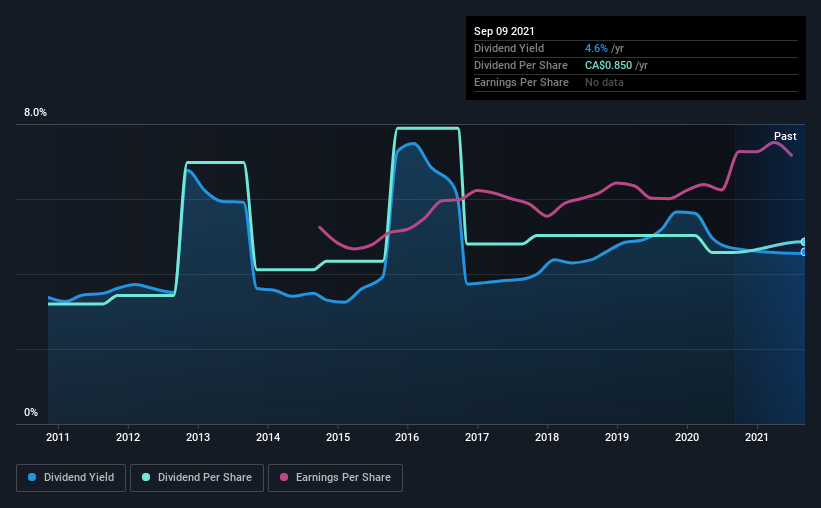Income Investors Should Know That Corby Spirit and Wine Limited (TSE:CSW.A) Goes Ex-Dividend Soon
Readers hoping to buy Corby Spirit and Wine Limited (TSE:CSW.A) for its dividend will need to make their move shortly, as the stock is about to trade ex-dividend. The ex-dividend date occurs one day before the record date which is the day on which shareholders need to be on the company's books in order to receive a dividend. The ex-dividend date is important as the process of settlement involves two full business days. So if you miss that date, you would not show up on the company's books on the record date. This means that investors who purchase Corby Spirit and Wine's shares on or after the 14th of September will not receive the dividend, which will be paid on the 29th of September.
The company's next dividend payment will be CA$0.21 per share. Last year, in total, the company distributed CA$0.85 to shareholders. Looking at the last 12 months of distributions, Corby Spirit and Wine has a trailing yield of approximately 4.6% on its current stock price of CA$18.51. We love seeing companies pay a dividend, but it's also important to be sure that laying the golden eggs isn't going to kill our golden goose! As a result, readers should always check whether Corby Spirit and Wine has been able to grow its dividends, or if the dividend might be cut.
Check out our latest analysis for Corby Spirit and Wine
Dividends are typically paid from company earnings. If a company pays more in dividends than it earned in profit, then the dividend could be unsustainable. Its dividend payout ratio is 79% of profit, which means the company is paying out a majority of its earnings. The relatively limited profit reinvestment could slow the rate of future earnings growth. We'd be concerned if earnings began to decline. A useful secondary check can be to evaluate whether Corby Spirit and Wine generated enough free cash flow to afford its dividend. Over the last year it paid out 64% of its free cash flow as dividends, within the usual range for most companies.
It's positive to see that Corby Spirit and Wine's dividend is covered by both profits and cash flow, since this is generally a sign that the dividend is sustainable, and a lower payout ratio usually suggests a greater margin of safety before the dividend gets cut.
Click here to see how much of its profit Corby Spirit and Wine paid out over the last 12 months.
Have Earnings And Dividends Been Growing?
Companies with consistently growing earnings per share generally make the best dividend stocks, as they usually find it easier to grow dividends per share. Investors love dividends, so if earnings fall and the dividend is reduced, expect a stock to be sold off heavily at the same time. This is why it's a relief to see Corby Spirit and Wine earnings per share are up 3.8% per annum over the last five years. A high payout ratio of 79% generally happens when a company can't find better uses for the cash. Combined with slim earnings growth in the past few years, Corby Spirit and Wine could be signalling that its future growth prospects are thin.
Many investors will assess a company's dividend performance by evaluating how much the dividend payments have changed over time. In the past 10 years, Corby Spirit and Wine has increased its dividend at approximately 4.3% a year on average. It's encouraging to see the company lifting dividends while earnings are growing, suggesting at least some corporate interest in rewarding shareholders.
Final Takeaway
From a dividend perspective, should investors buy or avoid Corby Spirit and Wine? Earnings per share growth has been unremarkable, and while the company is paying out a majority of its earnings and cash flow in the form of dividends, the dividend payments don't appear excessive. Overall, it's not a bad combination, but we feel that there are likely more attractive dividend prospects out there.
However if you're still interested in Corby Spirit and Wine as a potential investment, you should definitely consider some of the risks involved with Corby Spirit and Wine. Our analysis shows 1 warning sign for Corby Spirit and Wine and you should be aware of it before buying any shares.
A common investment mistake is buying the first interesting stock you see. Here you can find a list of promising dividend stocks with a greater than 2% yield and an upcoming dividend.
This article by Simply Wall St is general in nature. We provide commentary based on historical data and analyst forecasts only using an unbiased methodology and our articles are not intended to be financial advice. It does not constitute a recommendation to buy or sell any stock, and does not take account of your objectives, or your financial situation. We aim to bring you long-term focused analysis driven by fundamental data. Note that our analysis may not factor in the latest price-sensitive company announcements or qualitative material. Simply Wall St has no position in any stocks mentioned.
Have feedback on this article? Concerned about the content? Get in touch with us directly. Alternatively, email editorial-team (at) simplywallst.com.

 Yahoo Finance
Yahoo Finance 
